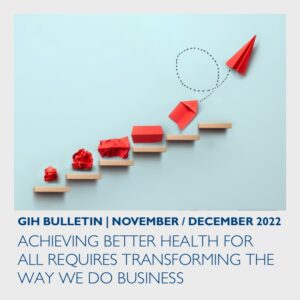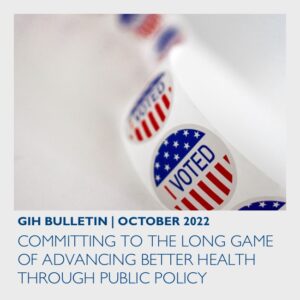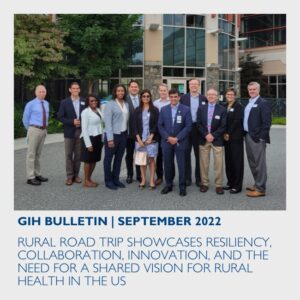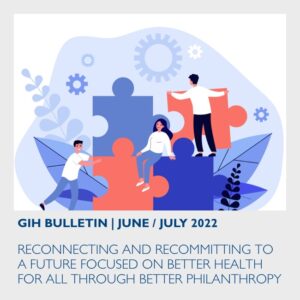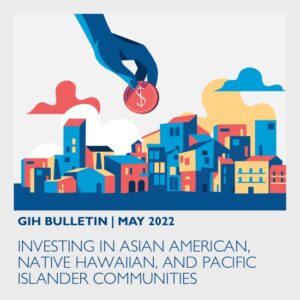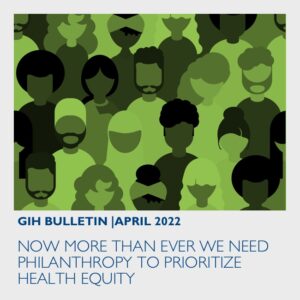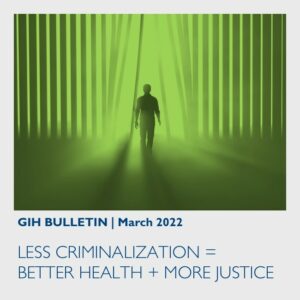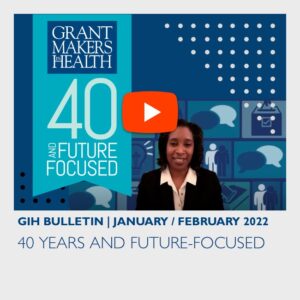GIH Bulletin: November/December 2022
This year has been an exciting time of renewal and transition at Grantmakers In Health. We celebrated our 40th anniversary and began implementing an ambitious five-year strategic plan, that included work to identify when and how GIH would use its voice to advance policies that support better health for all and at long last returned to in-person convenings with our annual conference, Fall Forum, and other events.
GIH Bulletin: October 2022
Every year around this time, we participate in a time-honored process of voting for candidates we believe align with our values. As people across the country prepare to vote in state and local elections, those of us working in health philanthropy should take a moment to reflect on what we can do to support policies to advance better health outcomes.
GIH Bulletin: September 2022
Last month I had the distinct pleasure of visiting Georgia and North Carolina with key partners in rural health. Our “rural road trip” was a refreshing journey that provided inspiration for philanthropy’s work and a reminder that ensuring better health for all must engage all rural communities.
GIH Bulletin: August 2022
It was so wonderful to see everyone in Miami at the 2022 Grantmakers In Health annual conference, especially those who joined us for the first time, and to learn more about the work you are doing to achieve better health for all through better philanthropy. The conference occurred at an important moment for our country. As Admiral Rachel Levine, U.S. Assistant Secretary for Health, said during our strategy session on advancing LGBTQ health equity “even after decades of social progress, the most vulnerable among us continue to suffer.” The conference provided an opportunity for us to reconnect, to reflect on the considerable health challenges facing the United States, and to learn and grow together as we explore and share solutions.
GIH Bulletin: June/July 2022
Much has changed since Grantmakers In Health (GIH) last convened in 2019. Over the past three years, more than 1 million Americans have lost their lives due to COVID-19. Large cracks in our public health, healthcare systems, and our safety net programs are apparent. In addition, pervasive inequities across all facets of society have increased. The country is divided, and this division continues to hamper our ability to address one of the greatest health challenges our modern world has ever faced.
GIH Bulletin: May 2022
May is Asian American Pacific Islander heritage month, celebrating the fastest-growing racial group in the United States. Recent priorities for grantmakers have focused on racial equity, health and well-being, and immigrant rights. Yet, investments for Asian American, Native Hawaiian, and Pacific Islanders (AANHPIs) have been under-resourced and deprioritized, receiving only 0.26 percent of philanthropic dollars and 0.17 percent of research funding from the National Institutes of Health.
GIH Bulletin: April 2022
April marks National Minority Health Month. It is a time for us to educate ourselves on the health challenges facing communities of color and other vulnerable populations, and to reflect on the progress we have made towards advancing health equity and what more we must do to ensure everyone has a fair and just opportunity to be as healthy as possible.
GIH Bulletin: March 2022
Last year, New York State passed the most sweeping parole reform measure in the country. The Less Is More Community Supervision Revocation Reform Act has far-reaching implications for the health and liberty of tens of thousands of people every year, by making critical changes in how the state handles noncriminal violations of parole conditions.
GIH Bulletin: January/February 2022
As we kick off GIH’s 40th anniversary year and begin implementing our new strategic plan, I invite you to listen in on this conversation between myself and past GIH leaders about how health philanthropy has evolved, what is on the horizon, and how GIH and health funders can be more future-focused to achieve better health. We look forward to working with you to achieving better health for all through better philanthropy.


